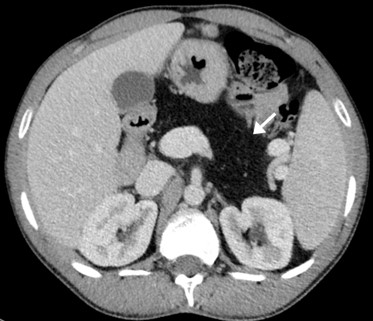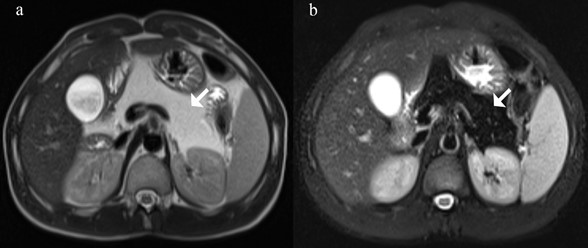Case
A 21-year-old male patient with cystic fibrosis (CF) presented to consultation with a history of steatorrhea for four months, without weight loss or abdominal pain. He had been submitted to a lung transplant two years before. The blood tests were unremarkable, except for a normocytic normochromic anemia (hemoglobin level: 12.4 g/dL). The stool test revealed a markedly reduced elastase level (<15µg/g versus a reference level >200 µg/g), in keeping with severe exocrine insufficiency.
Abdominal computed tomography (CT) followed by magnetic resonance with cholangiopancreatography (MRCP) were requested to evaluate the pancreatic parenchyma. The CT (Fig. 1) and MR (Fig. 2) showed an enlarged pancreas, with loss of its lobulated contour and total fatty replacement of the parenchyma. There were no calcifications or other abnormalities of the main pancreatic duct.

Fig. 1: CT image shows an enlarged pancreas (arrow) with diffuse fat density. There is also splenomegaly and portal vein enlargement, evocative of portal hypertension.
Discussion
Complete fatty replacement of the pancreas is typically associated with genetic conditions, such as CF, Shwachman- Diamond syndrome and Johanson-Blizzard syndrome. A lower degree of infiltration can be seen more commonly in elderly patients and in those with obesity, diabetes mellitus, steroid intake or chronic pancreatitis.(1)
The pancreas is the abdominal organ more frequently affected in patients with CF.(2) Moreover, fatty replacement of the pancreas can be found in 51 to 75% of the patients with CF and it is the most common pancreatic abnormality seen in this disease.(1) Mutations in the CFTR gene (CF transmembrane conductance regulator) lead to the impaction of thick mucus in the pancreatic ducts, which results in ductal obstruction followed by progressive fat deposition in the acinar cells. In fact, the degree of fat infiltration on imaging correlates with the degree of exocrine insufficiency.(2,3)
The fatty replacement of the pancreas in patients with CF can be focal or diffuse. Furthermore, it can be associated with pancreatic atrophy, but a smaller portion of patients may present a pseudohypertrophic appearance of the pancreas,(2) as seen in this case.
Other pancreatic manifestations of CF are chronic pancreatitis, pancreatic fibrosis and pancreatic cystosis.(1) Exocrine insufficiency management in patients with CF relies on pancreatic enzyme replacement associated with lifestyle modifications.(2)
















